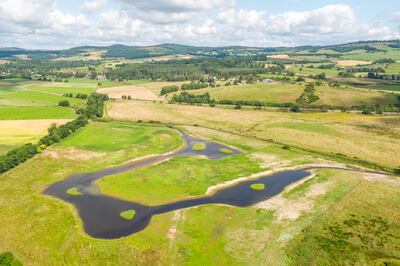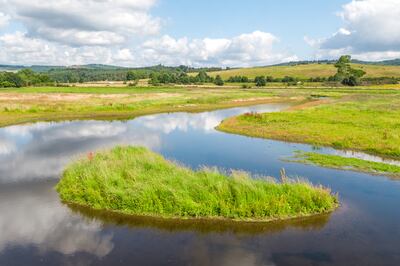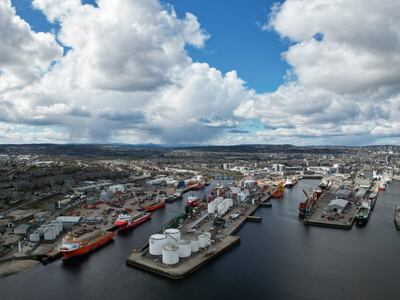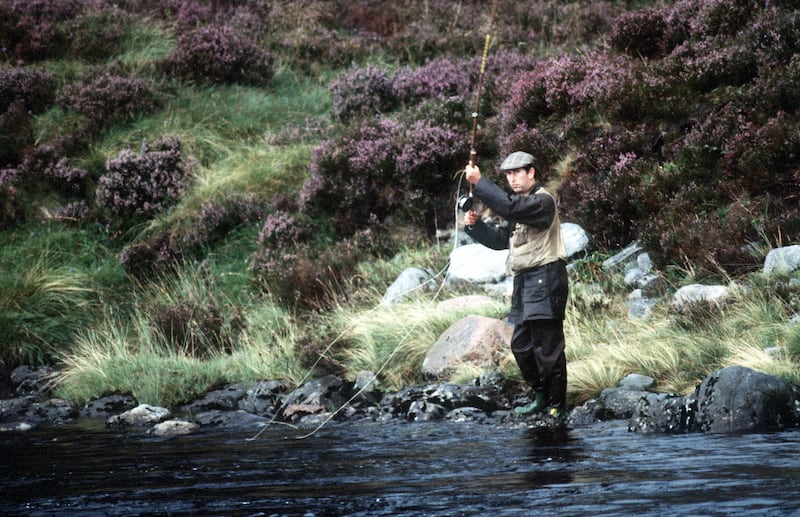The tides of history are turning in Scottish rivers, as scientists look to undo centuries of man-made damage that has put wildlife such as salmon and mussels at increasing risk from climate change.
The makeover of Aberdeenshire rivers popular with King Charles III is an example of what the UAE’s presidency of Cop28 has called a “top priority area” of restoring the planet's freshwater areas.
Along the River Dee that leads to Aberdeen, the UK’s offshore energy capital, trees are being planted to provide much-needed shade for the wild Atlantic salmon that make the river a famous fishing spot.
Streams that were once engineered into fast-flowing, dead-straight channels – hurting wildlife and increasing flood risks – are being allowed to meander again.
This kind of work can take years to bear fruit and sometimes involves awkward conversations with farmers, who question why hectares of their prized land should be given over to nature.
“The history of how humans have occupied and used land in this area, over roughly the last 250 years, has involved focusing on improving land for agriculture and moving water out of the way,” Susan Cooksley, a freshwater ecologist who manages the Dee Catchment Partnership, told The National.
“As a result you’ve got a landscape which is filled with water – it’s Scotland, after all – but actually, you quite often can’t see it.”
Cop28 chiefs want dozens of countries to commit to a UN-backed pledge called the Freshwater Challenge, which has a goal of restoring 300,000 kilometres of rivers and 350 million hectares of wetlands by 2030.
One day of talks in Dubai, December 10, will be dedicated to food, agriculture and water. Restoring freshwater is one of three water-related priorities, along with shielding cities and food systems.
The UN has called biodiversity “our strongest natural defence against climate change” because habitats such as forests and mangroves can absorb carbon dioxide.
But if biodiversity is a weapon against climate change, it is also a victim of it. Warming is occurring faster in Europe than on any other continent. There are predictions that temperatures in Scotland could rise by as much as 3°C or even 4°C by 2080.
Near the Deeside town of Banchory, tourists wait for the wild Atlantic salmon to come leaping up the Falls of Feugh, a beautiful spot with a stone footbridge. Balmoral Castle, the Scottish estate where Queen Elizabeth II died last year, only months earlier had a salmon-themed art installation to celebrate her platinum jubilee.
As heir to the throne, the now-King Charles went fishing in the Dee and gave a speech in 2017 lamenting the decline of its salmon population. After first going salmon fishing in 1955, he “never really wanted to fish for anything else”, he said.

With a lack of shade, the water is already getting “dangerously hot” for the famous salmon, with scientists regularly recording temperatures above 15°C to 16°C – where the species “really does struggle”, Ms Cooksley said.
“It’s incredible how the tree cover has disappeared over the last few centuries,” said Roger Owen, a fellow ecologist who heads the Scottish Wildlife Trust’s Aberdeenshire branch.
Freshwater pearl mussels are another species under threat. Their decline would be a blow to the whole ecosystem because of the way they filter water through their gills and clean it for other inhabitants.
Rethinking rivers
In the Dee, 28 boulders that were once arranged in artificial lines near Banchory have been randomly redistributed to offer a wider array of habitats for mussels, trout and salmon.
Another initiative is to bury dead wood from storm-damaged trees in the rivers, simulating a natural process that creates further habitats.
“In their natural state, a lot of the rivers were meandering, they had a pretty wide diversity of habitats to live in,” Mr Owen said. “In a dead-straight channel you’ve got a little canal running through a field and it flows in a very homogeneous, constant way.”

Diggers and bulldozers have been out across Deeside to restore the natural course of rivers. Another aim is to slow the flow of the water and thereby reduce flood risks downstream.
Aberdeen planning documents say the city can expect more intense rainfall in decades to come, with flood risks heightened due to harder, drier ground in summer and an expected 0.5-metre sea level rise.
Some of the wildlife recovery will be slow, because the mussels take about 15 years to start breeding. But earthworks on the Beltie Burn, one of the Dee's tributaries, brought some faster results.
“On the day that the diggers left the site, to our huge surprise, we had Atlantic salmon spawning, which was just a fantastic endorsement that said we’ve done something right here,” Ms Cooksley said.
Some of Aberdeen’s oil and gas companies have put money into nature restoration in the area – funding that Mr Owen welcomes despite the whiff of greenwashing.

The city is watching the energy transition play out along its skyline as wind turbines spin along the coast, even as the oil and gas industry looks to stay in the mix beyond Britain’s 2050 net-zero date.
When the world meets at Cop28, the UAE’s hope is that it will give a push to this kind of work. For the ecologists on the river banks in Aberdeenshire, that means raising both awareness and money.
Ms Cooksley wants the politicians to help pay off the farmers who are losing as much as 10 hectares of farmland at a time.
She said that some farmers would ask: “'Why on earth would I give up my best farmland so that you can undo 250 years of regeneration, really hard work to turn a bog into the best arable land I’ve got on my farm?'
“I need to be able to say more than ‘we need to do this for the nature and climate’. There needs to be a payment to incentivise that because otherwise you’re asking someone to give up their livelihood.”







